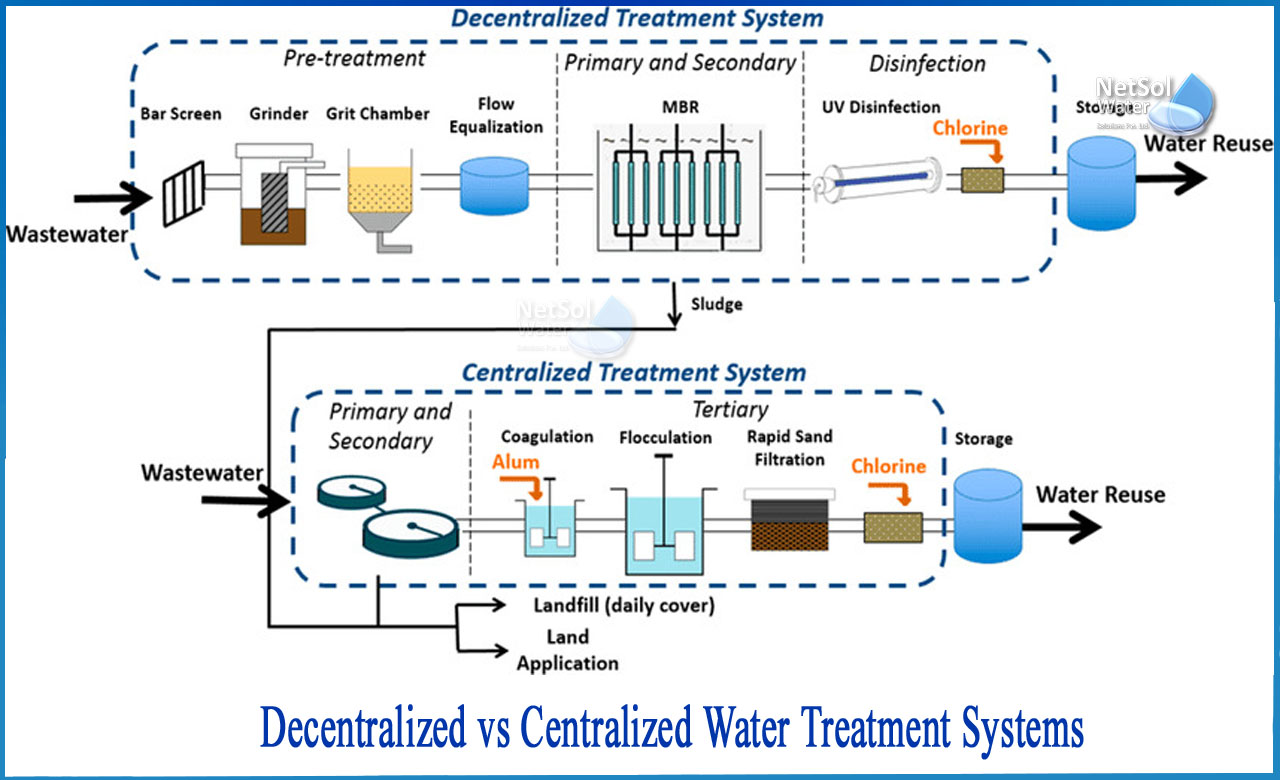What is the difference centralized and decentralized water Treatment?
There are two primary approaches to planning water and wastewater treatment systems in water management:
A: Large-scale plants that serve large municipal or regional service regions characterize centralized treatment.
B: Smaller facilities are positioned close to the water source or treatment demand, serving a more localised area in decentralized treatment.
Although both models have advantages, new technology, engineering, and financial structures are increasingly making decentralization the preferred strategy in a growing number of cases.
What are Decentralized Treatment Systems?
Decentralized treatment refers to the practice of treating water or wastewater at the point of supply, demand, or, in the best-case scenario, both. It's a more adaptable, long-term solution than massive treatment plants, which necessitate miles of costly supply and delivery infrastructure.
What are Centralized Treatment Systems?
The populace is provided with drinking water through huge, centralized water treatment plants in this strategy. The purified water is conveyed to all of the settlements in the treatment plant's service area, necessitating a large pipe network to reach even the most isolated communities. Larger municipalities or, more likely, the Water Boards in that region may manage and operate the treatment plants. Due to the availability of significant O&M budgets and qualified human resources, these plants should be well managed and run.
Scale Economies v/s Ideal Scale
Large-scale, centralized desalination or wastewater treatment plants that use extensive collection and distribution networks make use of economies of scale to treat water at a cheaper cost, but there are a number of drawbacks.
Decentralized wastewater treatment and desalination, on the other hand, can help more distant communities and industrial sites by bringing the right-sized treatment to where it's needed with significantly reduced set-up costs. Decentralized treatment can match the water price points and quality of centralized treatment once it is constructed.
This model can also be used in a business context. By reducing withdrawals from local water supplies, on-site decentralized water treatment can provide quality control, permit water reuse, lower utility bills, and conserve critical goodwill in the surrounding community.
Advantages and costs of a Centralized Water Treatment System
Coagulation, flocculation, sedimentation, filtration, and disinfection are all used in a centralized water treatment strategy, often known as conventional treatment. It treats water at a central place before distributing it to customers through dedicated distribution networks.
A centralized water treatment system in a city can process enormous volumes of water at high rates to meet the needs of all residential, commercial, and industrial users. This method has been well tested and can efficiently remove a wide variety of raw water turbidity as well as hazardous pathogens such as bacteria, virus, and protozoa.
Advantages and costs of a Decentralized Water Treatment System
A decentralized system, point-of-entry (POE) or point-of-use (POU) installed at the individual home or business can be utilized to achieve potable water when a centralized community treatment system is unavailable or costly. POUs are placed to treat water where it is needed, such as at kitchen and bathroom taps, whereas POEs treat raw water before it enters the property or residence.
POEs/POUs may be the only treatment option in undeveloped communities when financial resources and technical support are severely lacking. Although POEs/POUs are less expensive than centralized systems because they delay substantial upfront capital investments and lower operating and maintenance expenses, their treatment capacity and ability to deal with numerous contaminants are restricted. They also necessitate complete community buy-in and oversight.
Conclusion
When designing a water treatment system, one of the most important decisions to make is whether the system will be centralized or decentralized.
Because each water source is different, selecting a system to satisfy specific treatment goals should be done on a case-by-case basis, taking into account, variety of parameters.
How can Netsol Water help?
Netsol Water is a significant water and wastewater treatment firm in India, offering WTP, WWTP, STP, ETP and RO manufacture, among other services. We've made it our mission to save the planet. The company creates equipment’s and is committed to providing practical solutions that help businesses flourish.
We are committed to providing our valued customers with hands-on service, expert counselling, and training. Every environmental problem and its management have a solution in us.We can provide facilities to treat effluent from all industries, be manufacturing or processing.
Netsol Water is Greater Noida-based leading water & wastewater treatment plant manufacturer. We are industry's most demanding company based on client review and work quality. We are known as best commercial RO plant manufacturers, industrial RO plant manufacturer, sewage treatment plant manufacturer, Water Softener Plant Manufacturers and effluent treatment plant manufacturers. Apart from this 24x7 customer support is our USP. Call on +91-9650608473, or write us at enquiry@netsolwater.com for any support, inquiry or product-purchase related query.



